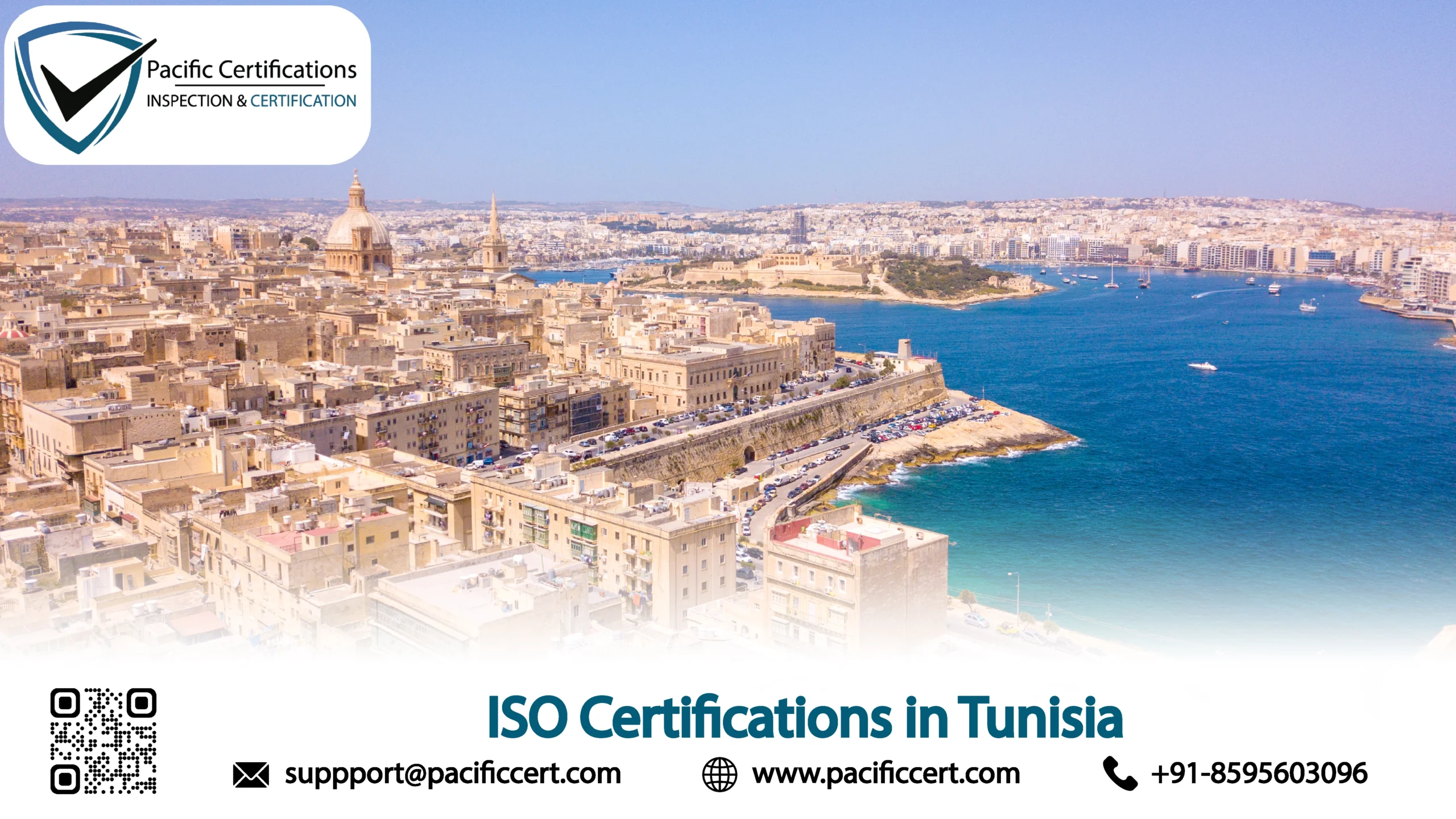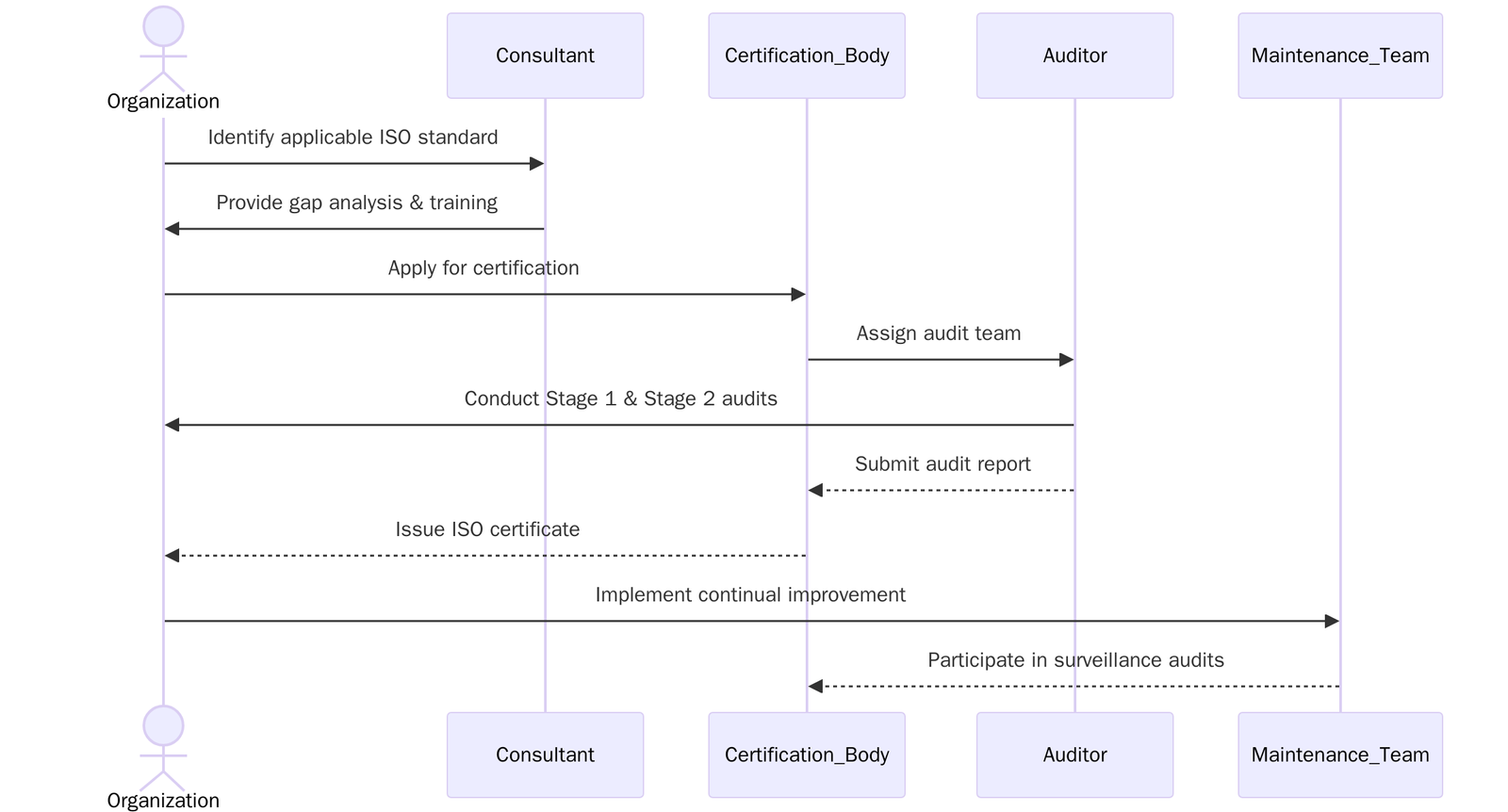
Introduction
Tunisia’s economy spans phosphates and fertilizers, hydrocarbons and gas services, automotive and electrical components, cement and construction, fisheries and cold chain, ports and logistics around Rades and Bizerte, healthcare and laboratories and a growing digital base in fintech, telecom and public e-services. By adopting ISO 9001 (Quality Management), ISO 14001 (Environmental Management) and ISO 45001 (Occupational Health & Safety), Tunisian companies can cut waste, stabilise quality and build trust with buyers and lenders. For fast-moving areas like logistics, construction, food processing and ICT, ISO certification is now a practical step to reach export markets and compete with confidence. These systems provide auditable proof on quality, safety, environment, energy, security and continuity across plants, sites, fleets and data rooms.
Share your scope with Pacific Certifications to align on accreditation, audit stages and timelines for Tunisia. We will map Stage-1 and Stage-2 dates and sampling suited to your sites.
Economic Context & Industry Overview
Phosphate and fertilizer plans are set for a late-decade recovery that pulls in mining services, rail and port handling. Ports report steady activity and new sailings that tighten schedules for terminals and 3PLs. The startup ecosystem benefits from a dedicated Startup Act, while government programs are preparing a new digital strategy through 2030. Energy policy points to rising renewables shares and green-hydrogen partnerships that require disciplined EHS, energy and continuity controls across the value chain.
Why ISO certification matters in Tunisia?
Buyers, EPCs and public bodies want evidence-based systems with traceable records. ISO is the assurance language that speeds vendor approval, steadies lines and sites, reduces incidents and protects data and uptime. ISO 9001 supports process control, ISO 14001 and ISO 45001 improve site stewardship and worker safety, and ISO 50001 drives energy performance at plants and ports. ISO/IEC 27001 and ISO 22301 build trust for banks, telecom and public platforms. ISO 22000 or FSSC 22000 helps food operators prove HACCP and cold-chain integrity.
Popular ISO Standards in Tunisia
| Industry focus | Commonly requested standards | Why they matter |
| Mining, phosphates, cement, utilities | ISO 9001, ISO 14001, ISO 45001, ISO 50001 | Consistent quality, safer work, environmental care, energy performance |
| Oil and gas services, EPC, pipelines | ISO 9001, ISO 14001, ISO 45001, ISO 22301 | Process discipline, site controls, continuity for critical services |
| Fisheries, processing, cold chain | ISO 22000, FSSC 22000, ISO 9001 | HACCP, temperature control, traceability for export |
| Ports, terminals, 3PL, warehousing | ISO 9001, ISO 14001, ISO 45001, ISO 28000 | Turnaround, safe handling, chain security |
| Banks, telecom, data centres, public platforms | ISO/IEC 27001, ISO 22301, ISO/IEC 20000-1, ISO/IEC 27701 | Security, continuity, service quality, privacy |
| Healthcare, labs, diagnostics | ISO 9001, ISO 15189, ISO/IEC 17025 | Patient trust, valid results, competence |
Certification Process in Tunisia
Preparation starts with an honest view of how work runs today and how evidence is captured. The aim is to make your system auditable without reinventing daily routines. Below are the steps to consider:
- List products services sites headcount and high-risk processes for clear scope
- Map processes end to end to show handoffs records and responsibilities
- Set policy and measurable objectives tied to customer and legal needs
- Build evidence packs for production maintenance labs IT and logistics
- Train process owners keep competence matrices and attendance records current
- Calibrate instruments verify methods and file certificates for quick checks
- Run internal audits that sample high-risk tasks and supplier interfaces
- Hold management review with KPIs audit results complaints legal updates and actions
- Schedule Stage 1 for readiness and Stage 2 for implementation verification align multi-site sampling to risk
- Blend on-site checks with remote interviews where suitable to reduce travel time
- Keep permits licences and regulatory reports organised for quick verification
What are the requirements of ISO Certifications in Tunisia?
Make the system mirror real work on lines, ports, plants, clinics and data rooms so records stand up in audits and buyer reviews; below are the key requirements:

- Scope that matches products or services, processes and sites including multi-site programs
- Document control with procedures and records that reflect practice not theory
- Risk assessment with controls for real hazards, HACCP, site safety, environmental aspects, privacy or security, energy and change management
- Competence matrices and training records for process owners and high-risk roles
- Internal audits with reports nonconformities root-cause actions and verified closures
- Management review with inputs- KPIs, audits, incidents or complaints, legal updates and tracked decisions
- Standard-specific artefacts: HACCP and CCP logs ISO 22000, Statement of Applicability and risk files ISO/IEC 27001, HIRA and PTW ISO 45001, aspect-impact registers and objectives ISO 14001, energy review and EPIs ISO 50001
- Legal and other requirements register with permits inspections calibrations monitoring data and supplier compliance proofs
Tip: Align controls to Tunisia’s personal-data law Organic Act 2004-63, sector hygiene and veterinary rules for fisheries and food, environmental permitting and monitoring and telecom or banking guidance for security and continuity.
What are the benefits of ISO Certifications in Tunisia?
Use certification to move faster through tenders and vendor onboarding, reassure lenders and partners and keep work steady across sites and seasons; below are the key benefits:

- Quicker prequalification in buyer portals and public procurement
- Fewer incident defects and stoppages on sites and lines
- Clear roles and skill paths for operations and maintenance
- Traceable data for warranty claims ESG and due diligence
- Tighter supplier control through audits KPIs and corrective actions
- Measured gains in energy use waste emissions uptime and yield
- Stronger brand signals for regional and global markets
Market Trends
Government and partner briefs target 35% renewable capacity by 2030, with pathways rising toward 2035 and 2050. MoUs for the H2 Notos project point to large-scale hydrogen for export through the SoutH(2) Corridor near 2030, which raises audit expectations on energy, EHS and continuity across desert sites, pipelines and ports. Expect broader adoption of ISO 50001, ISO 14001/45001 and ISO 22301 as projects move from studies to execution. (source: World Bank)
Authorities announced 2025–2026 modernisation waves and are developing a 2030 digital strategy that prioritises online services, cybersecurity and infrastructure. Operators that handle citizen data or payment flows will lean on ISO/IEC 27001, ISO 22301 and ISO/IEC 20000-1 to meet SLA and incident obligations as services scale. ( source: Developing Telecoms)
Challenges Faced in Tunisia
Operational, regulatory and evidence-readiness issues related to getting certified can cause delays—budgeting and staffing gaps, incomplete or outdated documentation and records, weak internal audits and corrective actions, supplier-control gaps, multi-site sampling and travel logistics, calibration and permit backlogs and data or privacy mapping for ICT; below are the key challenges:
- Budgeting for certification time and system upkeep
- Seeing ISO as a paperwork task in some teams which slows adoption
- Shortage of trained internal auditors outside major hubs
- Stalling on document control internal audits and corrective-action discipline
- Multi-site and supplier sampling complicating logistics and evidence quality
What is the cost of certification in Tunisia?
Budgets are confirmed after scoping and reflect headcount and risk, the number and spread of sites, your standards set, single or integrated such as 9001+14001+45001, sector sampling depth for plants ports pipelines or cold chains and travel or field logistics. Your proposal itemises Stage-1 Stage-2 and surveillance days, clarifies on-site versus remote activities and highlights any multi-site efficiencies for predictability.
For personalized quote, contact support@pacificcert.com.
What is the timeline for certification in Tunisia?
Timelines depend on document and record readiness, the speed of closing Stage-1 findings, single- versus multi-site scope and whether the program is single-standard or integrated. Planning around shutdowns fishing seasons project ramps or weather, plus auditor travel to remote sites, also affects duration. A prepared single site can move from application to decision within one audit cycle. Multi-site or integrated programs need additional sampling and planning time.
How Pacific Certifications can help?
Pacific Certifications audits and certifies ISO management systems for mining and materials, logistics and ports, fisheries and cold chain, construction and EPC, healthcare and labs and ICT or cloud across Tunisia. We work under recognized accreditation with transparent pricing and an experienced local team that understands site realities and buyer expectations. Our certificates are accepted by procurement portals and international customers and we are recognized by ABIS.
Request your ISO audit plan and fee estimate. We will help you map Stage 1 and Stage 2 timelines and evidence requirements for your organization. Contact us at support@pacificcert.com or visit www.pacificcert.com.
Accredited Training Programs
Pacific Certifications provides accredited training programs in Tunisia for ISO 9001, ISO 14001, ISO 45001, ISO 22000 or FSSC 22000, ISO/IEC 27001, ISO 22301 and ISO/IEC 20000-1.
- Lead Auditor Training: for professionals auditing these systems across Tunisian industries.
- Lead Implementer Training: for personnel establishing or improving systems in plants sites cold chains hospitals utilities and ICT platforms.
These programs are conducted online or onsite, depending on client needs under ISO/IEC 17024 for personnel certification.
To begin the process or request a quotation, contact us at support@pacificcert.com or visit www.pacificcert.com.
Our team will guide you through the audit and certification process and planning stages specific to your operations in Tunisia.
FAQ
How long does certification take in Tunisia?
A prepared single site can complete in one audit cycle from application to decision. Multi-site or integrated programs take longer due to sampling and scheduling.
What factors set the audit time?
Headcount, risk, number of sites, chosen standards and travel or logistics. We provide a documented proposal after scoping.
Can audits be partly remote?
Yes. Records reviews and interviews can be remote with targeted on-site sampling for high-risk processes and facilities.
Which standards suit mining and processing?
ISO 9001 + ISO 14001 + ISO 45001. Add ISO 50001 for energy-intensive plants.
What fits fisheries and cold chains?
ISO 22000 or FSSC 22000 for HACCP and traceability, with ISO 9001 for process stability.
How do banks and telecom platforms benefit?
ISO/IEC 27001 builds trust in security. ISO 22301 supports uptime commitments. ISO/IEC 20000-1 strengthens service quality.
Do you certify SMEs and NGOs?
Yes. We right-size audit time and sampling for small teams and distributed sites.
What should we prepare before Stage 1?
Scope, process map, risk and opportunity records, policy and objectives, competence records, controlled procedures, internal audit and management review.
Will international buyers accept our certificate?
Our accredited certificates are recognized by buyers and portals regionally and worldwide.
How do we maintain certification?
Run internal audits on schedule, close NCRs, hold management reviews, monitor KPIs, complete Year-1 and Year-2 surveillance and recertify in Year 3.
Ready to get ISO certified?
Contact Pacific Certifications to begin your certification journey today!
Suggested Certifications –
Read more: Pacific Blogs






